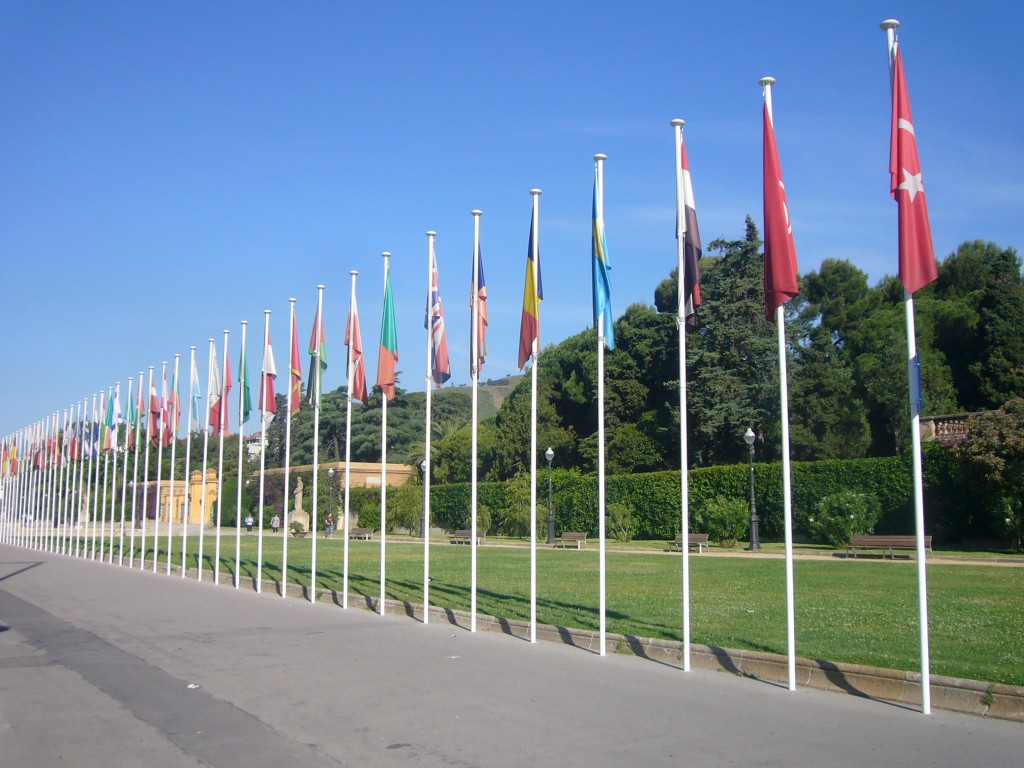Updated
Union for the Mediterranean (UfM) Report Highlights Transnational Cooperation – Jean R. AbiNader

Flags of member countries outside UfM headquarters in Barcelona. Photo by: Jordiferrer on Wikipedia. CC BY-SA 3.0
While a great deal has been written about the failure of the Arab Maghreb Union (AMU) to realize its potential for making North Africa a regional powerhouse, little is known in the US about the UfM and how it is creating new cooperative relationships across the Mediterranean basin. Led since 2012 by Secretary General Amb. Fathallah Sijilmassi, it pulls together its 43 member countries to develop projects that serve the people of the region despite political obstacles.
Ambassador Sijilmassi is a Moroccan diplomat who is best known to Americans as the first head of the Moroccan Investment Development Agency (AMDI), which initiated many of the incentives, databases, and relationships that have been central to Morocco’s economic growth. He also participated in the Free Trade Agreement negotiations with the US, as well as agreements with Europe and Arab and African countries. As a result, he is a recognized leader on Moroccan-Euro relations, especially in investment, regional cooperation, and development.
UfM recently released its 2016 annual report, highlighting previous accomplishments and initiatives and spelling out its 2017 agenda. According to its website, the UfM “serves as a framework for policy dialogue and exchange of project ideas, experiences and best practices among governments, key international institutions and cooperation structures. The UfM provides a unique platform to formulate regional priorities and decide on specific cooperation initiatives to be put in place.” It also places a special emphasis on improving conditions for women and youth.
The UfM bills itself as “an ecosystem. In a collaborative approach…stakeholders contribute decisively to the effectiveness of regional cooperation, with significant benefit for the overall objective of mutual understanding, development, peace and stability.” This positive message is backed up by millions of dollars of capital to fund projects in four areas: enhancing political dialogue among UfM members; ensuring the contribution of UfM activities to regional stability and human development; strengthening regional integration; and consolidating UfM capacity for action. In other words, despite whatever obstacles exist, UfM projects provide a platform on which the members can engage each other in cooperative efforts to build prosperity for their citizens.
A few examples of projects in which Morocco participates, along with other Mediterranean South countries, illustrate the vital role that UfM plays in the region:
- YouMatch, funded by the German development agency GIZ and the German government, brings together an array of experts from governments, the business sector, and civil society to develop better employment services for youth. Based on the notion that lessons learned and shared can improve the employment practices of the six participating countries, it seeks to build tools that will “help assess and improve existing labour market tools and will encourage peer learning and the exchange of expertise and best practices….” Algeria, Morocco, and Tunisia are involved in this project.
- Euro-Mediterranean University in Fez opened its campus in 2016 with 300 students in its first cohort. Targeting students from the Mediterranean region as well as Africa, it offers a multilingual and multidimensional program focused on development issues in the Mediterranean basin. Working with a consortium of Euro-Med universities, it is committed to advancing student employability and entrepreneurial skills. It is envisioned as a laboratory for creating the next generation of regional leaders.
- At the EMUNI University in Slovenia, professionals from Egypt, Palestine, Morocco, Algeria, Tunisia, and Ghana are enrolled in a one-year program to “equip would-be entrepreneurs with the skills they need to turn a bright idea into an innovative and sustainable business.” In collaboration with universities in Egypt, Italy, and Morocco, young professionals under the age of 40 with a background in science, math, engineering, or business are asked to come up with ideas for new businesses.
- Projects that support women as leaders and entrepreneurs include “Promoting Women’s Empowerment for Inclusive and Sustainable Industrial Development” and the “WOMED Next Generation of Leaders.” The first works to increase access for women entrepreneurs to coaching, investments, business partnerships, and matchmaking. The latter, which has been active since 2015, works to facilitate networks of female leaders interacting around ideas, resources, and research to support women’s empowerment.
- Morocco has played a leading role in UfM renewable energy projects under the SEMed Private Renewable Energy Framework, the first being a 120MW wind farm near Tangier, one of the country’s first private projects for producing renewable energy.
- An example of UfM’s infrastructure focus is the LOGISMED-TA project. It involves government and private sector trainees from Algeria, Egypt, Jordan, Morocco, and Tunisia, who will upgrade their skills through specifically designed courses to “create a network of logistics platforms meeting recognized quality standards” in such areas as customs, border and port management, logistics administration, and ultimately a regional free trade zone.
Other UfM projects can be found in the 2016 annual report. Suffice to say, it highlights concrete programs that are realizing actual results through collaborative means to achieve economic growth and integration. For example, a conference was held in December 2016 on issues of regional partnerships among universities and how to manage migrant and refugee credit recognition. Hopefully, by reducing barriers to cooperation and providing sustainable projects for its members, UfM will continue its successful efforts and enhance prospects for regional economic integration.